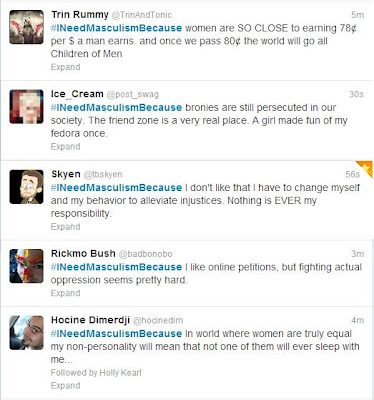"How old are you?"
... Really. That's what the complete stranger would like to start with? Well, this should be good.
"I'm 27," says our frustrated job seeker.
"Oh." The man is visibly surprised but undeterred. Here's a reasonably accurate paraphrase of what he's got to say next: "well, the problem with you... your generation, is that you don't stay. My firm does lots of hiring, but we don't hire you people because it's just too expensive to train you and you leave, so we hire immigrants. We bring in lots of immigrants."
The young woman politely but firmly thanks the man for his "advice" but indicates that she doesn't feel it's constructive and starts moving away from him. He touches her on the arm again and continues. This back and forth occurs a couple of times, then the woman, somewhat exasperated, says "I'm 27 and I have 5 years of management experience in non-profits, and I'd like to stay at the next position I get. I should at least get as far as an interview."
The man says "Honestly, I thought you were younger. And well, you might have to accept something at lower pay than you're making now, just to get your foot in the door, just til you know, you get to know someone."
Thankfully, this is where the woman and her friends get off the train, and her male friends spend the walk to their destination being just flabbergasted by the whole affair, and letting her know they had her back but didn't want to pile rescuing on mansplaining. Because they're totally awesome, supportive people.
As you may have guessed, our frustrated job seeker was me. And that is exactly what happened. A stranger approached me on the train to give me ageist, sexist career advice, and the only pertinent detail he felt he needed to get about me was my age. Not what I do now, not whether or not I have kids, not whether I wanted or needed his advice, whether or not I'm on the winning side of both the youth and gender wage gaps, which sector I work in now, and not even my name. It was lovely (sarcasm).
That's not the first time I've been confronted with generationalism about how "my people" are entitled, disloyal slackers, nor is it the first time I've been mansplained to. And it probably won't be the last (sadface). It is, however, the first time I've had both happen at once.
I've long had a problem with both phenomena. Sweeping generalizations generally don't serve very well for the starting point of meaningful social discourse. It's a kind of othering (more on that later), that creates divisions, not solutions.
The sweeping generalization of "young people as entitled" is one that I've always found particularly bothersome. It's paternalistic, short-sighted, elitist, and all but totally inaccurate. But it's also persistent. When young people take to the streets to protest ridiculous public policy moves like tuition increases, environmental stewardship, or any of the other myriad issues that get under 40s fired up (30s? whatever... what even is a young person?), it's because they're lazy and/or naive, not because they're getting a raw deal or because they care enough about the future (their future - all the old people will be dead by the time the tarsands are gone). Seriously - could you imagine what would happen if we talked about increasing taxes by $1625 per person over the next 3 years? There'd be an SUV-led revolution!
This has been exceptionally highlighted in the furor around the Quebec tuition protests of 2012. It's also firmly rebutted here. I strongly recommend reading the whole article, but the gist is
"The sense of entitlement among Canadian youth has been broadly mischaracterized as expecting something for nothing. On the contrary, insofar as young people feel entitled it is generally only inasmuch as they expect access to the same opportunities to which their predecessors were privy."
"The sense of entitlement among Canadian youth has been broadly mischaracterized as expecting something for nothing. On the contrary, insofar as young people feel entitled it is generally only inasmuch as they expect access to the same opportunities to which their predecessors were privy."
It's also gendered. Quite simply (only not simply at all, because I'm about to use a whack of big words): when you stack persistent systematized patriarchal pressures (wage gaps, institutionalized sexism, sexualization and objectification of women, privilege - the whole nine yards) within generationalism, you perpetuate the systematization of power as it currently stands. "We," the powerful, and "them" the lazy" creates a false dichotomy where "have-nots" are broadly and inaccurately defined as "not me" and are responsible for their own misfortunes; "they" are somehow to blame for any disadvantage or difficulty they currently find themselves facing up to and including their lived experiences of oppression. In my case, I'm expected to "accept a lower wage" because "young people" have somehow not lived up to the privileges of participating in the economy. And, because I am a woman, strange men feel comfortable coming up to me and saying so, as if that's somehow helpful or invited.
In short:
Dear Mr. Mansplainer,
The problem with "my generation" isn't us, or even me. It's you.









